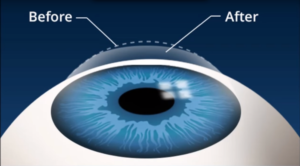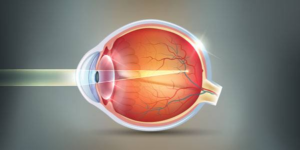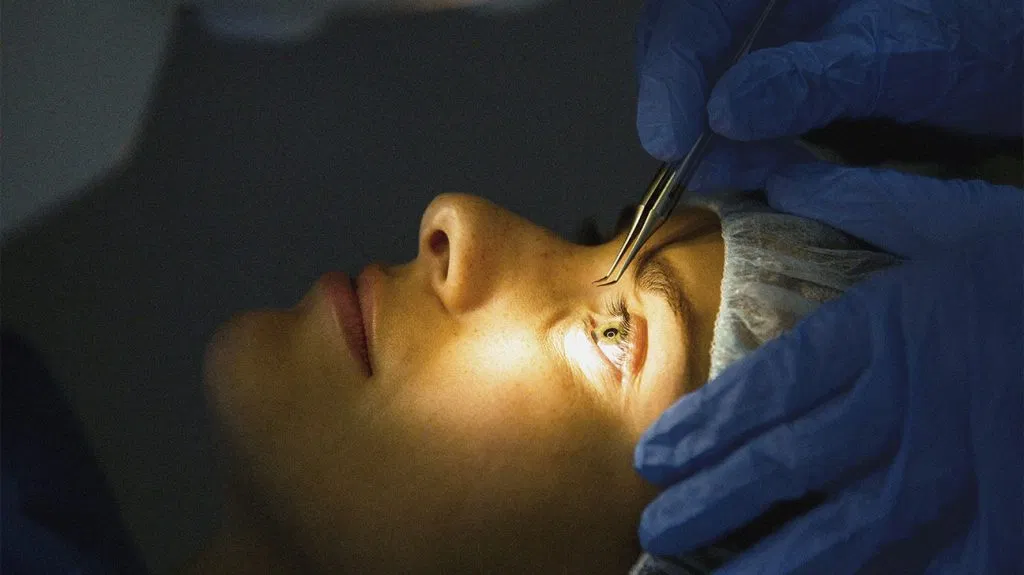If you are someone who is nearsighted, you know how difficult it can be to live life without glasses or contact lenses. You may have even considered undergoing surgery to correct your vision. If that’s the case, then you need to read this blog post! In it, we will discuss everything you need to know about myopia correction surgery. We will cover the types of surgery available, the risks and benefits of each one, and what you can expect during and after your procedure. By the end of this post, you will have a much better understanding of whether or not myopia correction surgery is right for you!
Contents
What Is Myopia Correction Surgery?
 Before understanding about the surgery, let us first learn what myopia is. Myopia, commonly known as nearsightedness, is a refractive error of the eye that causes light to focus in front of the retina instead of on it. This results in blurry vision for objects that are far away. Myopia can be corrected with glasses, contact lenses, or surgery.
Before understanding about the surgery, let us first learn what myopia is. Myopia, commonly known as nearsightedness, is a refractive error of the eye that causes light to focus in front of the retina instead of on it. This results in blurry vision for objects that are far away. Myopia can be corrected with glasses, contact lenses, or surgery.
Myopia correction surgery is a type of refractive surgery that is used to correct nearsightedness. There are three main types of myopia correction surgery: LASIK and PRK, and ICL.
- LASIK is the most common type of myopia correction surgery. It involves using a laser to create a small flap in the cornea. The surgeon then uses the laser to reshape the cornea so that light can be properly focused onto the retina.
- PRK is another type of myopia correction surgery. It does not involve creating a flap in the cornea. Instead, the surgeon uses a laser to remove a small amount of tissue from the surface of the cornea. This helps to reshape the cornea so that light can be properly focused onto the retina.
- ICL is also a type of myopia correction surgery, however, it is not as common as LASIK or PRK. It involves implanting a contact lens-like device in the eye to correct vision.
All of these types of surgery have been shown to be very effective at correcting nearsightedness. In fact, most people who undergo myopia correction surgery will end up with 20/20 vision or better!
When To Seek This Surgery?
Undergoing surgery is a very personal decision. You should only consider myopia correction surgery if you are unhappy with your current vision and are looking for a permanent solution. If you are considering surgery, you should schedule a consultation with an experienced surgeon. During your consultation, the surgeon will perform a thorough exam of your eyes and discuss your options with you.
Typically, myopia is considered to be mild if your eyeglass prescription is -0.75 diopters or less. If your myopia is more severe, you may be a good candidate for surgery.
Who Should Undergo This Surgery?
Myopia correction surgery is not for everyone. You may be a good candidate for this surgery if:
- You are at least 18 years old
- Your myopia is mild to moderate
- You have had stable vision for at least one year
- You do not have any other eye conditions that could affect the success of the surgery
- You are not pregnant or breastfeeding
Moreover, if you have spectacles over -12.00 diopters or contact lenses over -0.50, you are not a good candidate for this surgery as it can lead to some side effects. The most recommended target group of patients for this surgery are those with spectacles between 0.25 and -0.50 diopters.
If you meet all of the above criteria, then you may be a good candidate for myopia correction surgery. However, the only way to know for sure is to schedule a consultation with an eye surgeon. During your consultation, the surgeon will perform a thorough examination of your eyes to determine if you are a good candidate for this surgery.
Which Surgery Should You Choose?
 As discussed above, there are 3 major myopia correction surgery types. All three have been shown to be effective at correcting nearsightedness. So, which one should you choose?
As discussed above, there are 3 major myopia correction surgery types. All three have been shown to be effective at correcting nearsightedness. So, which one should you choose?
The type of surgery that is best for you will depend on a number of factors, including your age, the severity of your myopia, and your overall health. Your eye surgeon will be able to help you decide which type of surgery is best for you.
Moreover, the decision of which type of surgery to choose will also depend on your personal preferences. For example, some people may prefer LASIK because it has a shorter recovery time than PRK. Others may prefer PRK because it does not involve creating a flap in the cornea.
Ultimately, the decision of which type of myopia correction surgery to undergo is up to you.
If you are considering myopia correction surgery, then be sure to schedule a consultation with an experienced eye surgeon. During your consultation, the surgeon will be able to answer any questions you may have and help you decide if this surgery is right for you.
What Are The Benefits?
 Regardless of its type, myopia correction surgery serves the same purpose: to help you see clearly without the use of corrective lenses. This surgery can provide a number of benefits, including:
Regardless of its type, myopia correction surgery serves the same purpose: to help you see clearly without the use of corrective lenses. This surgery can provide a number of benefits, including:
- Improved vision
- Reduced dependence on corrective lenses
- Convenience (no need to carry around glasses or contact lenses)
- Increased confidence
- Improved quality of life
If you are considering myopia correction surgery, then be sure to schedule a consultation with an experienced eye surgeon.
Are There Any Risks?
As with any type of surgery, there are some risks associated with myopia correction surgery. These include:
- Dry eyes
- Glare and halos around lights
- Undercorrection or overcorrection of myopia
These risks are typically very rare and can be easily managed by your eye surgeon.
What Does Recovery Look Like?
The recovery from myopia correction surgery is typically very quick and easy. Most people are able to see well enough to drive within a day or two of their surgery. However, it may take a few weeks for your vision to fully heal.
During recovery, it is advisable to avoid strenuous activities and to protect your eyes from dirt, dust, and other potential irritants. Your eye surgeon will provide you with specific instructions on what you should and should not do during your recovery.
Moreover, they will also provide you with a schedule of follow-up appointments to ensure that your eyes are healing properly.
Myopia correction surgery is a safe and effective way to correct nearsightedness. If you think you may be a good candidate for this surgery, be sure to schedule a consultation with an experienced eye surgeon.
Are There Any Alternatives?
If you do not wish to undergo surgery for myopia correction, do not worry! There are a number of alternative treatments that can help you improve your vision. These include:
- Glasses: Wearing corrective lenses is the most common way to treat myopia.
- Contact lenses: Contact lenses can also be used to correct nearsightedness.
- Vision therapy: Vision therapy is a type of treatment that can be used to improve the way your brain processes visual information.
- Orthokeratology: Orthokeratology, also known as corneal refractive therapy, is a type of treatment that involves wearing special contact lenses overnight. These lenses gently reshape the cornea, which results in improved vision during the day.
- At-home remedies: There are a number of at-home exercises that can be used to improve vision. These include eye exercises, relaxation techniques, and diet changes.
These alternatives are not as effective as surgery, but they may be a good option for you if you do not wish to undergo surgery.
If you are considering myopia correction surgery, then be sure to schedule a consultation with your ophthalmologist.
Conclusion
In conclusion of the above, myopia correction surgery is a safe and effective way to improve your vision. It comes with a few risks, but these are typically very rare and can be easily managed by your surgeon. The recovery from this surgery is usually quick and easy, with most people seeing well enough to drive within a day or two of their surgery. If you think you may be a good candidate for myopia correction surgery, be sure to schedule a consultation with your ophthalmologist.
If you have any more questions, feel free to contact Eye Mantra’s experts. EyeMantra offers the most advanced lasik options including PRK, Femto Lasik , SMILE surgery, Standard lasik and Contoura vision. If you have any questions on lasik surgery, lasik surgery cost and lasik procedure, call us at +91-9711116605 or email at [email protected].


